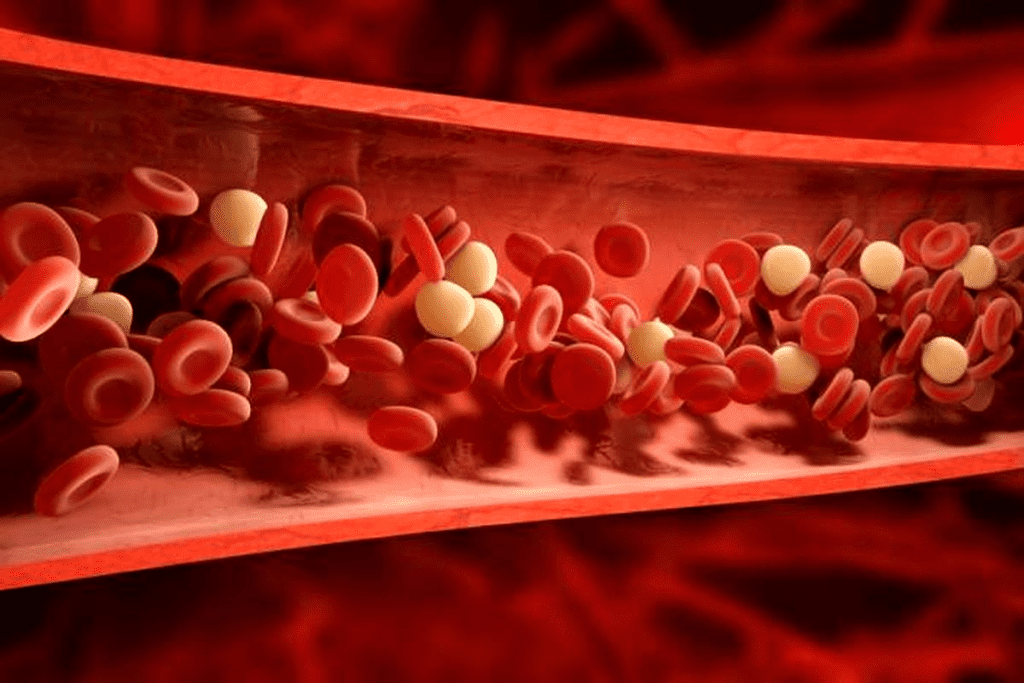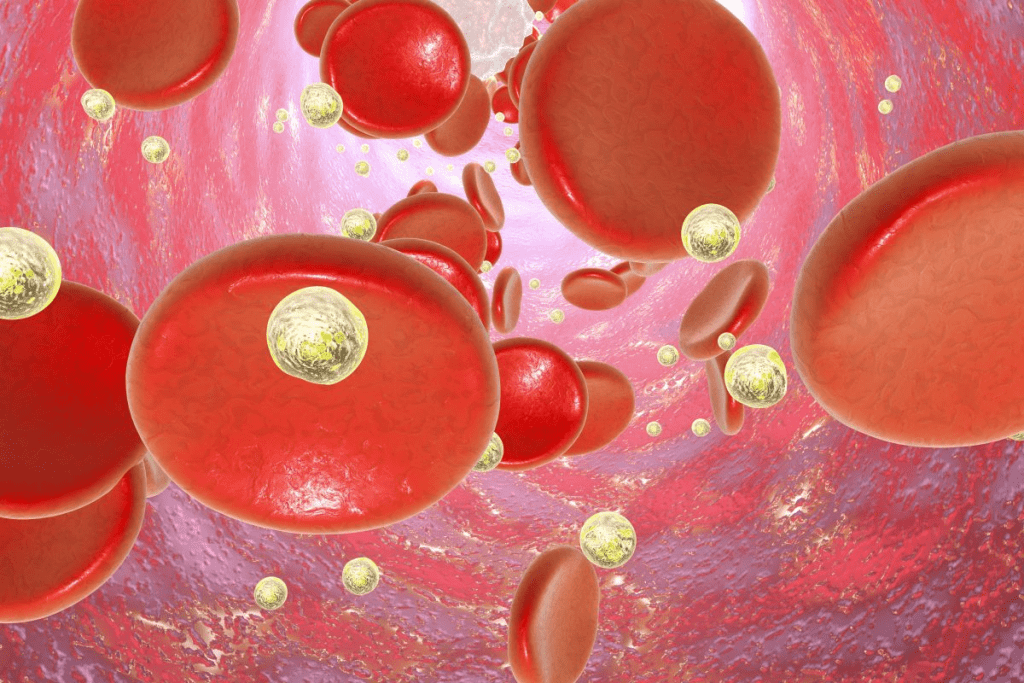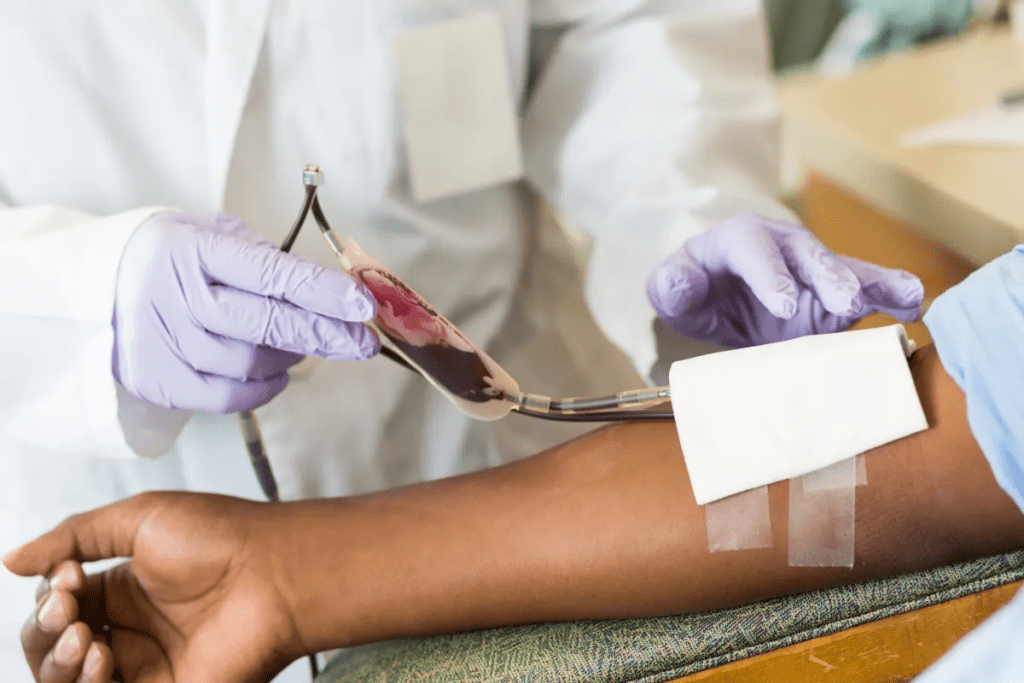
Did you know there’s a blood type so rare, only a few people have it worldwide? The golden blood disorder, also known as Rh null, is a rare condition that exemplifies the complexity of human blood types. It’s the rarest blood type in the world, with less than 40 people known to have it.
The Golden Blood Disorder, also known as Rh null, is a rare condition that exemplifies the complexity of human blood types.
Key Takeaways
- The Golden Blood Disorder is also known as Rh null.
- It’s considered the rarest blood type globally.
- Fewer than 40 individuals have been identified with this condition.
- The condition has significant medical implications.
- Understanding Rh null provides insights into human biology.
The The The The Phenomenon of Golden Blood: Understanding Rh Null
Golden Blood, also known as Rh null, is a rare blood type. It has caught a lot of attention because of its special traits and the health issues it can cause.
Definition and Basic Characteristics
Golden Blood, or Rh null, doesn’t have Rh antigens on its red blood cells. Antigens can cause an immune reaction. In blood transfusions, knowing if they are present or not is key. The Rh blood type system is important, and people with Rh null blood have none of these antigens.
Why It’s Called “Golden Blood”
The name “Golden Blood” comes from its rarity and value. Like gold, it’s very rare and valuable. This makes it very important for emergency blood transfusions where matching is critical.
Position in Blood Classification Systems
In blood classification, Rh null is a rare type within the Rh system. This system sorts blood based on Rh antigens. Rh null stands out because it has no Rh antigens, unlike other rare blood types.
Learning about Golden Blood helps us understand transfusion medicine and immunohematology better. Its unique features are not only useful for rare transfusions but also help us understand blood group antigens at a genetic and molecular level.
Only a few people worldwide have Rh null blood type. This makes it a big deal in transfusion medicine. It’s special because red blood cells don’t have Rh antigens on their surface.
Global Statistics and Known Cases
There are very few cases of Rh null blood type globally. This is because it needs specific genetic conditions. It’s a rare condition that’s hard for patients and doctors to deal with.
It’s hard to say exactly how many people have Rh null blood type. But it’s clear it’s very rare. Every case is important for learning about it.
Comparison to Other Rare Blood Types
Rh null is different from other rare blood types because it has no Rh antigens. This makes it very compatible for transfusions. But, it’s hard for people with this blood type to find compatible blood.
Challenges in Tracking and Documenting Cases
Finding and recording Rh null blood type cases is hard. It’s rare and not many places can test for it. We need more research and teamwork to understand and manage it.
We also need special blood banks for people with Rh null blood type. We must improve how we handle this rare condition to help those affected.
The Golden Blood Disorder, also known as Rh null, is a rare condition that exemplifies the complexity of human blood types.

The genetic basis of Golden Blood is complex. It involves inherited traits and mutations. These changes mean red blood cells lack Rh antigens.
Blood Type Genetics Fundamentals
Blood type is based on specific antigens on red blood cells. The Rh blood type system is key, with genes coding for Rh antigens. The production of these antigens is vital for red blood cells to work right.
The genetics of blood type is complex. It involves many alleles and genes working together. This determines an individual’s blood type.
The Specific Genetic Mutation Causing Rh Null
The Rh null blood type comes from a genetic mutation. This mutation can change the gene for Rh antigens or affect how they’re made. This results in no Rh antigens on red blood cells, marking the Rh null phenotype.
Inheritance Patterns and Family Genetics
The Rh null pattern is autosomal recessive. This means you need two copies of the mutated gene to have the condition. Carriers, with one normal and one mutated gene, usually don’t show Rh null but can pass the mutated gene to their kids.
By studying families with Rh null, researchers learn about inheritance. This helps predict Rh null in future generations. Knowing this is key for managing Golden Blood and caring for those with it.
Historical Discovery and Documentation of Rh Null Blood

Rh null blood was first found in the 1960s. It’s rare because it lacks Rh antigens on red blood cells. This rare blood type has caught the eye of many in the medical field.
First Documented Cases in the 1960s
The first Rh null blood cases were found during a time of big leaps in blood typing and transfusion medicine. This discovery was key. It showed us more about the Rh blood group system and the variety of human blood.
Some important things from the first cases are:
- No Rh antigens on the red blood cells of those affected.
- A unique genetic cause, different from other blood types.
- Important for blood transfusions for people with Rh null blood.
Evolution of Understanding in Medical Science
Our knowledge of Rh null blood has grown a lot over the years. New genetic tests and studies in immunohematology have shed light on the genetic causes. Research has also looked into health issues for those with Rh null blood, like problems with transfusions and pregnancy.
Important steps in our growing understanding include:
- Finding the genetic mutations that cause Rh null blood.
- Looking into health and immune system effects for those with Rh null blood.
- Creating special blood transfusion plans for Rh null patients.
As medical science keeps improving, we’ll learn more about Rh null blood. This could lead to new treatments for this rare condition.
Medical Implications of Having Golden Blood
People with the rare Rh null blood type, known as ‘Golden Blood,’ face unique health challenges. We will look at the health issues related to this rare blood type. We’ll focus on the specific problems Rh null individuals may have.
Health Challenges for Rh Null Individuals
Those with Golden Blood may face health problems. One major concern is anemia and other blood disorders. The lack of Rh antigens on red blood cells can cause issues with blood transfusions.
This makes it important for Rh null individuals to get compatible blood. The absence of these antigens can also affect their overall health. This may lead to conditions that need careful medical management.
Pregnancy and Childbirth Complications
Pregnancy can be tough for women with Rh null blood type. The risk of complications during pregnancy and childbirth is higher. This is because the mother’s immune system may react to the Rh antigens on the fetus’s red blood cells.
This can cause hemolytic disease of the newborn (HDN), a serious condition. Pregnant women with Golden Blood need close monitoring and specialized care. We work with healthcare providers to create a care plan that meets their unique needs.
Immune System Considerations
The immune system of those with Rh null blood type may be more sensitive. This sensitivity can cause adverse reactions during blood transfusions or pregnancies. This highlights the need for compatible blood and careful monitoring.
We also look at the broader implications for the immune system. This includes the risk of increased susceptibility to infections or autoimmune disorders. Understanding these risks is key to providing the right medical care for individuals with Golden Blood.
In conclusion, having Golden Blood comes with several medical challenges. By understanding these challenges, we can better support those with this rare blood type. This ensures they get the care they need.
Golden Blood and Transfusion Challenges
Golden Blood is very rare and can be given to anyone. But, finding blood for those with this type is very hard.
The Universal Donor Paradox
People with Type O negative blood are often called universal donors. But, those with Golden Blood, or Rh null, are even more universal. Their blood is compatible with almost anyone. Yet, they can only get blood from others with Rh null, which is very rare.
Transfusion Protocols for Rh Null Patients
Transfusions for Rh null patients need special care. Doctors must first check if there’s compatible Rh null blood. If not, they might use Type O negative blood, which is close but not perfect. This requires careful planning and working with blood banks worldwide.
| Blood Type | Compatibility | Transfusion Protocol |
| Rh Null | Universal Donor | Requires Rh Null or Type O Negative |
| Type O Negative | Universal Donor (conventional) | Can receive from Type O Negative |
Global Blood Bank Networks for Rare Types
Global blood bank networks are key for rare blood types like Rh null. They help share blood across countries and regions. This ensures rare blood is available when needed. Groups like the American Rare Donor Program and the International Society of Blood Transfusion help by keeping donor registries and coordinating efforts.
The Golden Blood Disorder, also known as Rh null, is a rare condition that exemplifies the complexity of human blood types.
Living with the Rarest Blood Type in the World
Living with golden blood is a unique challenge. It requires careful planning and consideration. People with Rh null blood type face a complex landscape of health implications and lifestyle adjustments.
Personal Stories and Experiences
People with golden blood share stories of resilience and adaptation. For example, one person had to undergo extensive medical screening before any surgery. This shows the need for careful planning in their daily lives. “It’s not just about having a rare blood type; it’s about living with the knowledge that you’re one of a handful of people worldwide with this condition.”
Lifestyle Adaptations and Precautions
Those with golden blood must take special precautions. This includes carrying medical alert information and being ready for emergencies. As one person noted,
“I’ve learned to always carry a medical alert card and to inform my healthcare providers about my Rh null status before any treatment.”
Such measures are key to ensuring medical professionals understand their unique needs.
Medical Alert Systems and Emergency Planning
Having a strong medical alert system is vital. This includes wearing medical alert jewelry and keeping a record of their Rh null status. Emergency planning is not just about having a plan; it’s about being prepared for any situation that may arise.
By taking these precautions and being proactive, individuals with golden blood can lead fulfilling lives. Despite the challenges of their rare blood type, they can thrive.
Diagnosis and Testing for Rh Null Blood
Finding out if someone has Rh null blood is a detailed process. It’s not just like regular blood tests. This is because Rh null blood is so rare. Doctors need to know a lot about it and use special tests to figure it out.
Limitations of Standard Blood Type Testing
Regular blood tests can only find common blood types. They can’t spot Rh null blood because it lacks all Rh antigens. So, people with Rh null blood might get the wrong blood type if only standard tests are used.
Specialized Testing Methods
To find Rh null blood, doctors use special tests. These include advanced blood tests and genetic tests. Blood tests check for specific antigens, and genetic tests look for the genetic changes that cause Rh null blood.
Advanced Diagnostic Techniques:
- Serological testing to identify antigen profiles
- Molecular genetic testing to detect genetic mutations
- Extended phenotyping to characterize the blood type fully
When to Suspect Rh Null Status
Doctors might think of Rh null blood if someone reacts badly to blood transfusions. Or if regular blood tests don’t give clear results. People from areas where Rh null blood is more common or those with family history might also need these tests.
Knowing the limits of regular blood tests and using special ones helps us find Rh null blood. This way, we can give the right care to those with this rare condition.
The Role of Golden Blood in Medical Research
The rare Rh null blood type is very valuable for medical research. It helps us learn more about immunohematology. This knowledge can make patient care and blood transfusions better.
Contributions to Immunohematology
Studying Rh null blood has improved our understanding of the Rh blood group system. This is key in immunohematology. By looking at the genetic changes that cause Rh null, scientists learn more about the Rh system.
This knowledge is important for making transfusions safer and improving patient care.
Research Applications and Studies
Many studies use Rh null blood to learn about blood groups and transfusions. For example, research looks at how Rh null blood reacts in different transfusion situations. This research helps create better transfusion plans for people with rare blood types.
Ethical Considerations in Rare Blood Research
Studying Rh null blood has many benefits but also raises ethical questions. Researchers must respect the privacy and rights of those with this rare blood type. It’s important to get informed consent and keep their information private.
The world needs to work together to set rules for using Rh null blood. This will help solve ethical problems and make sure research is done right.
Becoming a Golden Blood Donor
Donating blood is a lifesaving act for those needing rare transfusions. It’s a big deal for Rh null donors. They go through a detailed process to donate.
Critical Importance of Rh Null Donors
Rh null donors are key because their blood is safe for many patients. It lacks Rh antigens, making it rare and valuable. This reduces the chance of bad reactions during transfusions.
Donation Process and Special Protocols
The donation process for Golden Blood donors is unique:
- Initial screening to confirm Rh null status
- Comprehensive medical history review
- Specialized blood collection and storage procedures
Donors must meet health and eligibility standards. Their donations are managed carefully to ensure quality and safety.
| Donation Step | Description |
| Initial Screening | Confirming Rh null status through advanced blood typing tests |
| Medical History Review | Assessing donor health and eligibility |
| Blood Collection | Using specialized equipment to ensure blood quality |
International Donor Registries and Networks
International donor registries are vital. They connect Rh null donors with patients worldwide. These registries help exchange rare blood, ensuring patients get what they need quickly.
By donating, individuals can greatly help patients needing rare blood. We urge eligible donors to join international registries. This way, they can help save lives across the globe.
Global Distribution and Ethnic Patterns of Rh Null
Rh null blood is found in many ethnic and geographic groups around the world. This shows us its genetic and cultural importance. Some areas have more Rh null blood due to their genetics.
Geographic Clusters and Prevalence
Rh null blood doesn’t spread out evenly globally. It’s found in certain areas, often tied to specific ethnic groups. For example, early cases were in Europe, while Asia and the Americas also have it.
Key regions with reported cases include:
- Europe: Countries with big populations and detailed medical records have it.
- Asia: Some ethnic groups in Asia have more Rh null blood.
- The Americas: It’s found in indigenous and European ancestry groups.
Evolutionary and Anthropological Perspectives
The spread of Rh null blood tells us about human migration and genetic variety. It shows how genetics can change in isolated communities. This can happen through genetic drift or close marriages.
Studying Rh null blood helps us understand genetics and anthropology better.
Looking at where Rh null blood is found helps us understand it better. It’s important for both medicine and anthropology.
Future Directions in Golden Blood Research
The Golden Blood Disorder, also known as Rh null, is a rare condition that exemplifies the complexity of human blood types.
Emerging Treatments and Management Approaches
Scientists are working on new treatments to help people with golden blood live better lives. They’re looking into advanced transfusion methods and personalized care for Rh null individuals. Emerging treatments aim to tackle the special problems faced by those with this rare blood type.
Genetic Engineering and Synthetic Blood Alternatives
The field of genetic engineering and synthetic blood alternatives is being explored for new solutions. Genetic engineering might fix the genetic issues causing Rh null blood. Synthetic blood could make transfusions work for everyone, not just those with compatible blood types.
These developments are exciting not just for golden blood patients but for transfusion medicine too. It’s key to keep supporting research and development. This will help us find new ways to treat and care for people with golden blood.
Conclusion
We’ve looked into Golden Blood, also known as Rh null, a rare blood type. It has caught a lot of attention in medical studies. This blood type is special because it doesn’t have Rh antigens on red blood cells.
The Golden Blood Disorder, also known as Rh null, is a rare condition that exemplifies the complexity of human blood types.
Studying rare blood types like Rh null helps us care for people with these conditions better. It also helps the whole field of medical research grow. The study of Golden Blood shows how genetics, immunology, and medicine are all connected. It shows we need to keep researching and working together in medicine.
FAQ
How rare is Rh null blood type?
Rh null blood type is extremely rare, with fewer than 50 cases reported worldwide. It’s considered the rarest blood type globally, making it highly valuable for medical research and transfusions.
What are the medical implications of having Golden Blood?
Individuals with Golden Blood may face health challenges, including complications during pregnancy and childbirth, and immune system considerations. They require specialized medical care and attention.
Can Rh null individuals receive blood transfusions from anyone?
No, Rh null individuals can only receive blood from other Rh null individuals. But, their blood can be transfused to anyone with any ABO blood type, making them “universal donors.”
How is Rh null blood type diagnosed?
Diagnosing Rh null blood type requires specialized testing methods. Standard blood type testing may not detect the Rh null condition. Suspected cases are typically confirmed through advanced immunohematological testing.
Why is Rh null blood important for medical research?
Rh null blood has contributed significantly to immunohematology research. It helps scientists understand the complexities of blood type genetics and the human immune system.
Can anyone become a Golden Blood donor?
No, only individuals with Rh null blood type can become Golden Blood donors. The donation process involves special protocols to ensure the blood is handled and stored properly.
Are there any specific lifestyle adaptations required for Rh null individuals?
Yes, Rh null individuals need to take precautions to ensure their safety. They should wear medical alert jewelry and have emergency plans in place in case of a medical emergency.
What is the future of Golden Blood research?
Ongoing research into Golden Blood is focused on emerging treatments, management approaches, and the use of genetic engineering and synthetic blood alternatives.
Is Rh null blood type associated with any specific ethnic or geographic patterns?
Yes, Rh null blood type has been found in specific geographic clusters and ethnic populations. This provides insights into its evolutionary and anthropological significance.
References
Ennis, S. D. (2023, November 17). RH Null Blood Type: The Rarest of the Rare. East and North Midlands Blood Bikes.
https://www.ejbio.co.uk/post/rh-null-blood-type-the-rarest-of-the-rare



































